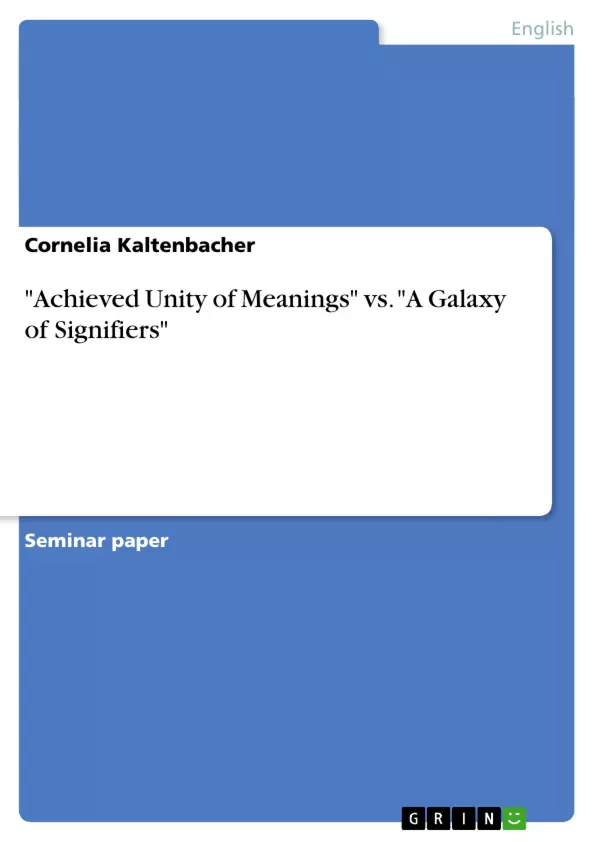“Criticism, is the overall term for studies concerned with defining, clasifying, analysing, interpreting, and evaluating works of literature.”1 What I’m going to analyze in this work is not criticism, but “theoretical criticism”. Theoretical criticism proposes a theory of literature, in the sense of general principles, together with a set of terms, distinctions and categories , to be applied to identifying and analyzing works of literature, as well as the “criteria”2 by which these works and their writers are to be evaluated. Since the 1970s there has been a flood of writings, Continental, American and English, proposing diverse nove l and radical forms of critical theory. Why do we need criticism? In order to understand texts or to give them the “right interpretation”3. But can one speak about a right interpretation? In order to find a plausible answer to this question, I will focus on two of the most important modern literary theories, namely New Criticism, defined as “an achieved unity of meanings”4 and Deconstruction as “a galaxy of signifiers”5, comparing the two ones by means of the consulted essays on New Criticism and Deconstruction.
But before comparing the two theories, I will first introduce you into the meaning and features of both theories, presenting you some of the most important critics and their essays and critical theories referring to New Criticism and Deconstruction. I will dedicate the last two units of my paper to an ample comparison between New Criticism and Deconstruction, showing you, that there are both similarities and differences to find in the two theories, and that in spite of all the differences, the former survives in the last one. Moreover, I will point some personal conclusions concerning my own point of view to the topics mentioned above.
Inhaltsverzeichnis (Table of Contents)
- Introduction
- New Criticism
- Definition and features
- T. S. Eliot
- R. P. Blackmur
- Cleanth Brooks
- Deconstruction
- General views
- Jacques Derrida and Ferdinand de Saussure
- Hillis Miller
- Paul de Man
- “An Achieved Unity of Meanings” vs. “A Galaxy of Signifiers”- Comparing New Criticism to Deconstruction
- Conclusion - Personal Notes
Zielsetzung und Themenschwerpunkte (Objectives and Key Themes)
This paper aims to explore the theories of New Criticism and Deconstruction by comparing and contrasting their central tenets. The paper focuses on understanding the evolution of literary criticism since World War I and analyzes the key concepts and methods of each theory, including their strengths and limitations.
- The nature of literary criticism and its role in interpreting texts
- The relationship between author, text, and reader in literary analysis
- The concept of "achieved unity of meanings" in New Criticism
- The concept of "a galaxy of signifiers" in Deconstruction
- The similarities and differences between New Criticism and Deconstruction
Zusammenfassung der Kapitel (Chapter Summaries)
- The introduction defines the term "modernism" in literature and sets the context for the emergence of new critical theories in the 20th century. It introduces the two main subjects of analysis: New Criticism and Deconstruction, and outlines the paper's objective of comparing these theories.
- Chapter 2 focuses on New Criticism, defining its features, core principles, and key figures like T.S. Eliot, R.P. Blackmur, and Cleanth Brooks. It emphasizes the importance of analyzing the text itself, independent of external factors.
- Chapter 3 delves into Deconstruction, exploring its general views, key figures like Jacques Derrida and Ferdinand de Saussure, and influential critics like Hillis Miller and Paul de Man. This chapter highlights the deconstructionist approach to textual analysis, which emphasizes the inherent instability of meaning and the multiplicity of interpretations.
Schlüsselwörter (Keywords)
This paper focuses on the key terms and concepts of New Criticism and Deconstruction, including: literary criticism, textual analysis, achieved unity of meanings, galaxy of signifiers, interpretation, meaning, text, reader, author, and critical theory.
Frequently Asked Questions
What is "New Criticism" in literary theory?
New Criticism defines a work of literature as an "achieved unity of meanings," focusing on the text itself independent of the author's intent or historical context.
How does Deconstruction view a literary text?
Deconstruction sees a text as a "galaxy of signifiers," emphasizing the instability of meaning and the multiplicity of possible interpretations.
Who are key figures of New Criticism mentioned in the paper?
The paper discusses critics such as T. S. Eliot, R. P. Blackmur, and Cleanth Brooks.
What is "theoretical criticism"?
It is a branch of studies concerned with proposing theories, categories, and criteria to identify and analyze works of literature.
Are there similarities between New Criticism and Deconstruction?
Yes, the paper argues that despite their differences, elements of New Criticism survive within the deconstructionist approach.
- Arbeit zitieren
- Cornelia Kaltenbacher (Autor:in), 2003, "Achieved Unity of Meanings" vs. "A Galaxy of Signifiers", München, GRIN Verlag, https://www.grin.com/document/21921



